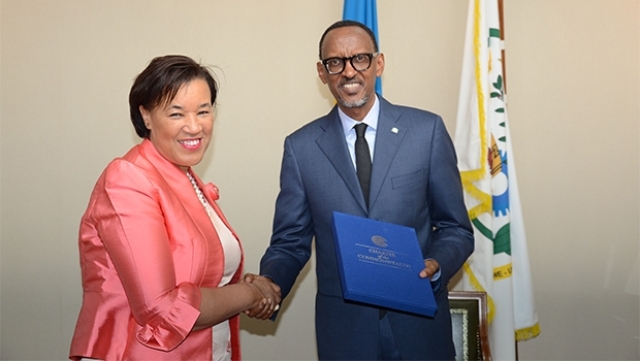 [Photo: Secretary-General Patricia Scotland and President Paul Kagame - Commonwealth Secretariat]
[Photo: Secretary-General Patricia Scotland and President Paul Kagame - Commonwealth Secretariat]
[This is an excerpt from an editorial from the latest edition of The Round Table: The Commonwealth Journal of International Affairs.]
Global attention will be on Rwanda when it plays host to the Commonwealth Heads of Government Meeting (CHOGM) in June 2020. With 53-member nations, representing both the developed and developing countries of the world, mostly former British colonies, this is no doubt the biggest and most prestigious international conference that Rwanda could be hosting. To those familiar with the recent history of this small landlocked country in the Great Lakes region of Africa, especially the horrific genocide of 25 years ago, it is remarkable how Rwanda has transformed itself so quickly and has bounced back into international reckoning.
The country has been attracting many visitors. And foreign investors are rushing in. They have been impressed with the transformation and development that have taken place there under the leadership of the country’s enigmatic leader President Paul Kagame. Kagame is difficult to dissect. He only tolerates the West. He detests them and does not want them to interfere in what he’s doing in Rwanda. He’s been very tough on Western media in particular, most especially those who accuse him of human rights violations.
‘The 1994 genocide was an example of how the West are waiting on us to kill each other so they can share our gold and take our lands. I and your fathers came and stopped the killings,’ he told a gathering of young Rwandans who had recently graduated from a civic training programme.
He went on: ‘Now, they [the West] are not happy, they might kill me, but before then, I want you to understand that your destiny is in your hands,’ he told the youths
This is Kagame! The former General has successfully carved this image of a transformatory, if not visionary, leader for himself in Africa – an image that is making several countries on the continent not only take notice of him but take him seriously and look towards Rwanda for inspiration and as a role model for development. Kagame is coming across as the face of a new and progressive modern Africa. An Africa where democracy does not necessarily have to be the model for governance, but any other governance model, even if it has to be home-grown inasmuch as it brings development and prosperity to the people, will suffice. He himself has had to change the country’s constitution to be able to stay on in power for a third term – a move for which he has been heavily criticised, and which he has equally stoutly defended. It has brought him to loggerheads with pro-democracy activists and NGOs who see him as a pseudo-democrat and consider him to be very autocratic, if not dictatorial. He has said he doesn’t mind critics labelling him autocratic; as long as he is getting good results, Rwandans still appreciate him and see him delivering the dividends of good governance and leadership, with zero tolerance for corruption.
The CHOGM due to take place in Kigali in June 2020 is therefore a big deal for Rwanda and East Africa – if not Africa as a whole. It provides an opportunity for Kagame to showcase to the world the post-genocide Rwanda by bringing into his tiny country for a whole week a third of the entire world that the Commonwealth represents; for them to come and see the wonders and miracles he has performed in 25 years to raise Rwanda from the ashes of death. President Kagame would be hoping that the CHOGM visitors will be impressed with what he has achieved.
That could be seen in Rwanda’s confidence in branding this as ‘Africa’s CHOGM’. And why not? Africans have that family spirit of doing things together and leveraging on the success of a fellow African nation. Besides, CHOGM does not come to Africa as frequently as it should. After South Africa in 1999, Nigeria in 2001, and Uganda in 2007 there has been a 13-year gap for the continent, and, of course, many African leaders were displeased by the way that Patricia Scotland got elected as Secretary-General of the Commonwealth in Malta in 2015.
Kayode Soyinka is the editor-in-chief of Africa Today Magazine.



